Decentralisation - MozFest 2018 - a Facilitator's Perspective
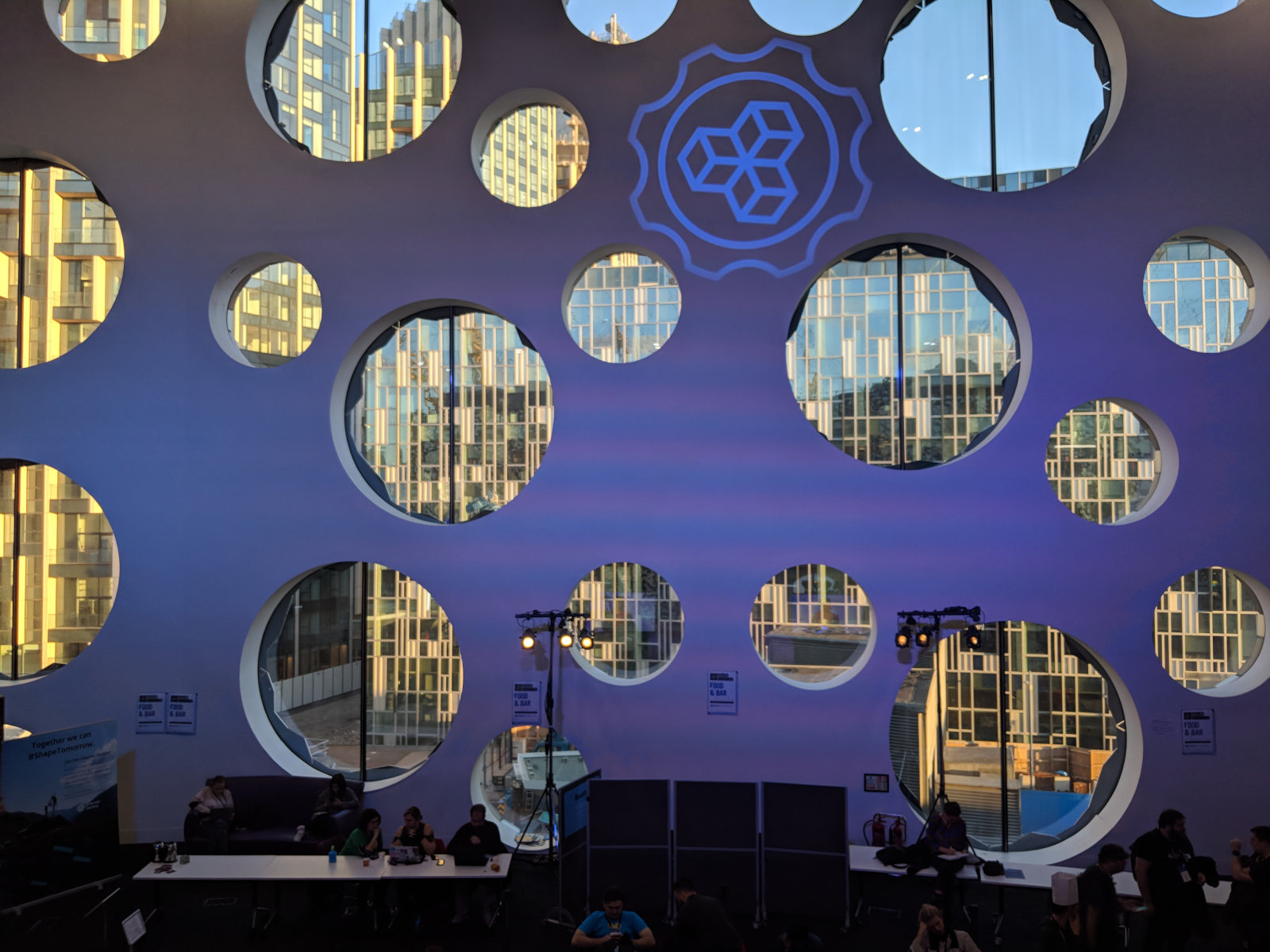
In October last year it was my distinct pleasure to help wrangle the Decentralisation Space at the ninth Mozilla Festival in London, UK.
There’s certainly been an uptick in interest since we first wrangled the Decentralisation Space in 2017 - a momentum we are hoping will continue to build.
We even had Tim Berners-Lee ask if he could set up an improptu stand to promote the decentralised Solid project. I guess the 'inventor' of the web setting up camp in your space is some kind of validation.
A diverse group of five - the Decentralisation Space Wranglers were spread over three continents. We decided from the outset that diversity would be an important theme for the space and this was reflected in the sessions that we ended up selecting.
We wanted to create a space that conveyed fantasy, futurism and positivity - concepts reflected in the theme we chose - a parallel universe named Xenshana which explores notions of decentralisation through technology and beyond. Read more about that in Kade's blog post.
Whether it was the face-painting, the ad-hoc fashioning of jelly-fish hung from the ceilings or the huge images of Xenshana characters, I was overwhelmed by the friendliness and creativity of a space that was communally made and appealling to children and adults alike.
All told, we ran 48 sessions covering topics such as Trade Unions, Public Service Internet, Speed Dating, Podcasting, Holographic Learning right through to sessions detailing the trials and tribulations of Black Cosplayers. I think I can speak for the whole team when I say that we were really happy with the breadth of the submissions and that we all feel strongly that there's so much more to decentralisation than the technical aspects. We see decentralisation as a social movement as well as a technical one. Of course, in many cases the technical groundwork has to be in place - which why it was great to see sessions on Decentralised Web Standards, and protocols such as ActivityPub and IPFS. At the end of the day the plan was for visitors to experience the true spectrum of subjects that fell under the umbrella term of Decentralisation.
Compiling a summary of all of those sessions can be extremely time-consuming - so in true decentralised fashion - I thought a better way of doing things might be to ask all the facilitators a common set of questions. Questions about what linked their sessions to the decentralisation topic, particpation and how people could get involved and stay in touch. What follows are the responses we received.
⌘
Patterns for Decentralised Organising
Facilitated by Nati Lombardo (Argentina) and Richard Bartlett (New Zealand)
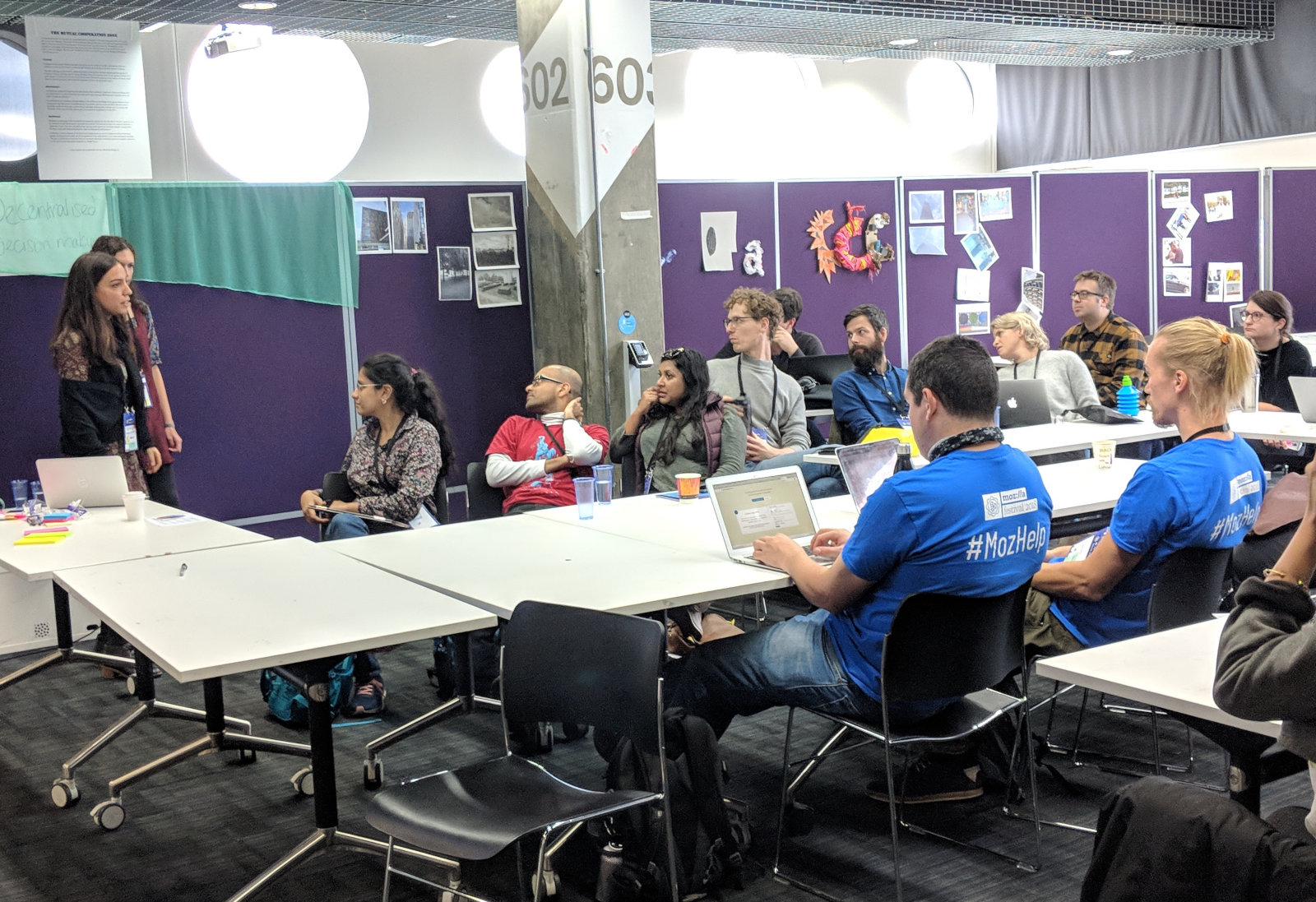
What was the session about?
This session was about what goes wrong when nobody is in charge, and what you can do about it. We used games, exercises, and short presentations to explore solutions to the most common dysfunctions of non-hierarchical organisations. People left with practical tools to support decentralisation (e.g. how to equalise care labour; distribute power; dealing with conflict; different decision-making methods).
How did the session fit in with the theme of decentralisation?
Decentralisation is often thought of in terms of technology first, assuming that new software will produce new social structures. We work in the reverse direction, exploring new social structures, with only an incidental connection to tech. In other words, let's practice decentralising power in our team of 10 people, before we make claims about how our tech platform will decentralise power in society.
In what way were participants valuable in your session?
The session was about "patterns", experiences that are common in all collaborative groups. We illustrate these patterns through the stories of participants lived experience. This gives people a frame of reference to interpret their group dynamics, not just as a specific interaction between a few people, but also as a symptom of broader cultural tendencies.
How can people get more information on the topic or get involved?
Our "patterns" work is summarised into this short booklet and is developing into this longer book, featuring real stories from people who join in our workshops.
⌘
Space Decentralization
Nikita Singh, Gokulakrishnan, Chaitanya Raju, Prashanth D (India)
What was the session about?
Our session was about providing general information on the decentralization theme and how one can develop a decentralized VPN (Virtual Private Network) using technologies like blockchains and smart contracts as the regular VPNs that we use are centralized are not reliable when it comes to data security and privacy. We also explored the differences between a VPN and TOR and why DVPN is advantageous over both. There was also a hands on session where a DVPN node was created.
How did the session fit in with the theme of decentralisation?
Decentralization is delegating responsibility to everyone in the network and as our session deals with the very same thing, which is to remove the central source and give authority to everyone present in the network. We found our session fitting with this theme.
In what way were participants valuable in your session?
The participants gave us mixed reviews which helped in showing us our strong and weak points.
How has your session topic progressed since MozFest? Did the session contribute to that progress in any way?
The topic is on progress and the session did have a role in it.
How can people get more information on the topic or get involved?
People can get involved by contacting Nikita-Singh or ajaykrishnavasudev via GitHub.
⌘
Defying our senses to promote diversity and inclusion in science communication with IGNITE
Gracielle Higino (Brazil)
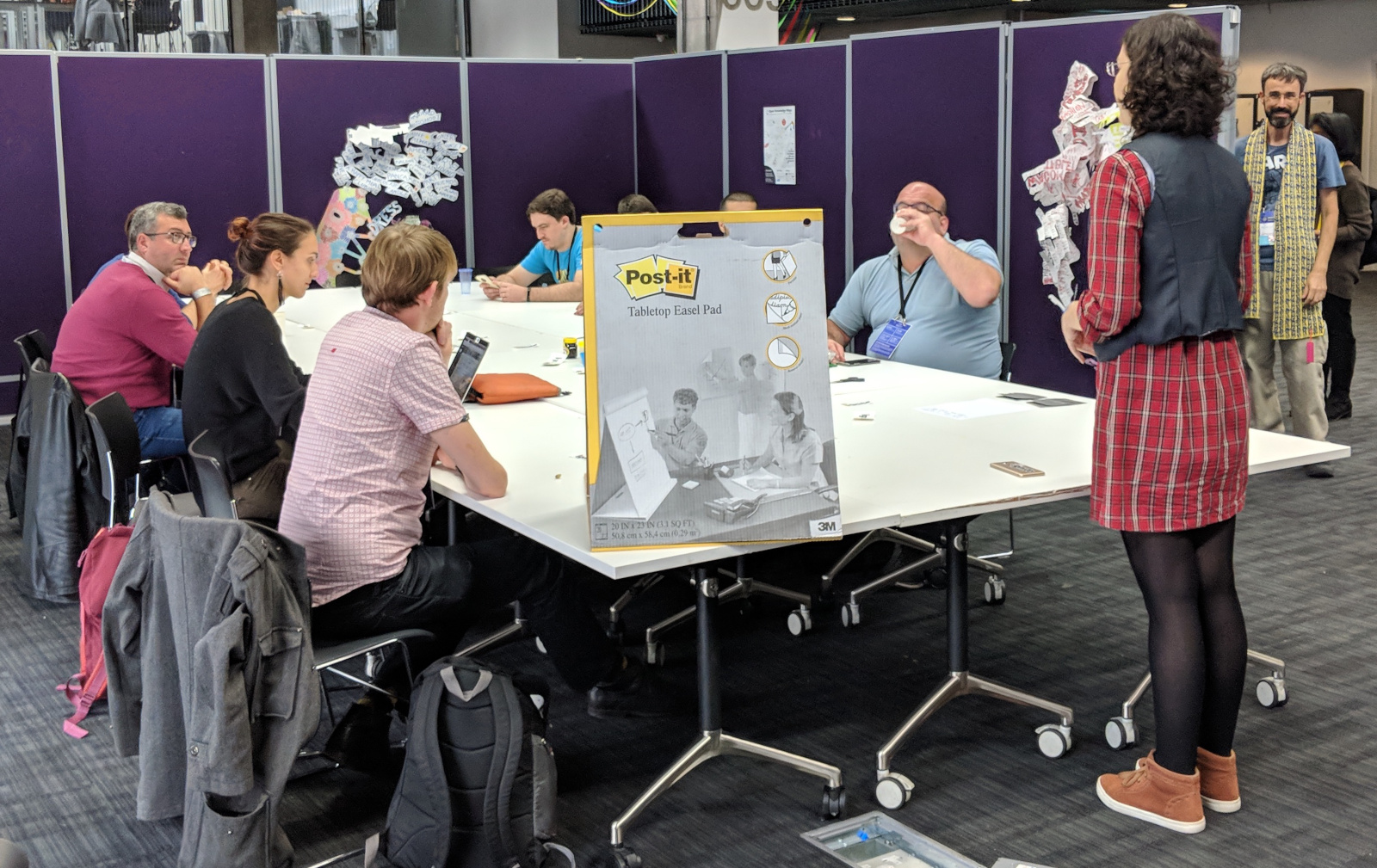
What was the session about?
How can we explore different senses to communicate science? What are the limits for science communication? In this session, we pushed the boundaries of IGNITE (a project to train scientists in Science Communication) and talked about how to communicate science in unusual and accessible ways, using different objects to explore and test the understanding of scientific concepts for different audiences.
We had an AMAZING sort of materials provided by MozFest (THANK YOU!!) such as pen + paper, sticky notes, musical instruments for kids, plasticine, four different spices (that smelled good or bad), building blocks and crayons. We first discussed what kinds of accessibility issues we could be facing when communicating science and agreed that language, access to information on PDF's and data, colors and subtitles are the main barriers in science communication. Then we brainstormed together on how to overcome these problems using our materials on the table. Some of the products were a word counter per second made with building blocks, a story about climate change using bells and spices, an object made with plasticine that could be two different things - depending on which color you are able to see and how the object is displayed, and an illustration on how videos could use images to illustrate what the narrator is saying, as a way to overcome language barriers. At the end of the session, we wrote down advice for scientists to communicate their findings to non-specialists.
How did the session fit in with the theme of decentralisation?
Science communication is all about decentralizing knowledge. Our session aimed at exploring all aspects of this by making participants ask themselves how we can outreach to absolutely everyone when talking about science.
In what way were participants valuable in your session?
Participants were amazing! There were scientists, science communicators, educators, people that already work with inclusion, and people that face accessibility issues when trying to access scientific information. This heterogeneity allowed us to discuss different aspects of accessibility in SciComm and to come up with a pretty complete guide to inclusive science communication.
How has your session topic progressed since MozFest? Did the session contribute to that progress in any way?
The session was essential to structure and to kickstart this issue inside the IGNITE project. We are already implementing the guide in our lessons and spreading it online.
How can people get more information on the topic or get involved?
We documented all the session in this issue on the IGNITE repository. You can join us there or contact us on contact [at] ignitescicomm [dot] com.
⌘
Actions Matter: Visualizing Impact with Greenpeace
Laura Hilliger (Germany), Gabor Galgocz (Netherlands), Kelli Tolen (Netherlands), Magali Fatome (France)
What was the session about?
At Greenpeace, we’re thinking about how we can help activists show their work. Activism happens in the real world. People take to the streets and line up at city halls to demand change. Lawyers and lobbyists – not just corporate ones – donate their time and energy fighting for better policies. People, like you and me, show up to events (like Mozfest!) and meet people, collaborate and strive to make the world a better place.
In our session, we talked about all the things we wished we could track about our participation in civic life and environmentalism. We talked about using data to show the world, or just ourselves, the impact we have on everyday issues - like ocean cleanup, air pollution or livestock agriculture. We invited people to help us design a way to visualize individual and global impact (doing some crazy eights). And we talked about the Engagement Platform we're building, Planet 4.
How did the session fit in with the theme of decentralisation?
We need a movement of decentralized activism to work on global issues like climate change, and decentralized data about that will help us understand the impacts we're making globally.
In what way were participants valuable in your session?
It's incredibly valuable to hear some many different perspectives on environmentalism and activism because it helps us understand how we can encourage and support the behaviors that will lead to a better world in many different contexts.
How has your session topic progressed since MozFest? Did the session contribute to that progress in any way?
We reaffirmed our vision and got some ideas about features and content, so yes being at Mozfest was valuable.
How can people get more information information on the topic or get involved?
http://medium.com/planet4 or email the Planet 4 team at [email protected]
⌘
Holographic Learning
Ashish Mishra and Megha Khosla (Lucknow, India).
What was the session about?
We taught participants the development of holographic games with holographic devices which will project things in the air. Importance of holographic, future scope of this technology & how this will gonna change technology trend forever.
How did the session fit in with the theme of decentralisation?
This was a Learning Forum session under local contribution in decentralisation space.
In what way were participants valuable in your session?
There was about 20 participants and they all were really valuable in our session.
How has your session topic progressed since MozFest? Did the session contribute to that progress in any way?
Yes, our project progress is going fine, we are spreading awareness people about holographic learning.
How can people get more information on the topic or get involved?
We will be soon available all the details online from their people will get information and can involve.
⌘
Sociocracy: a practical introduction to consent-based decision making
Kayleigh Walsh, Pete Burden (UK)
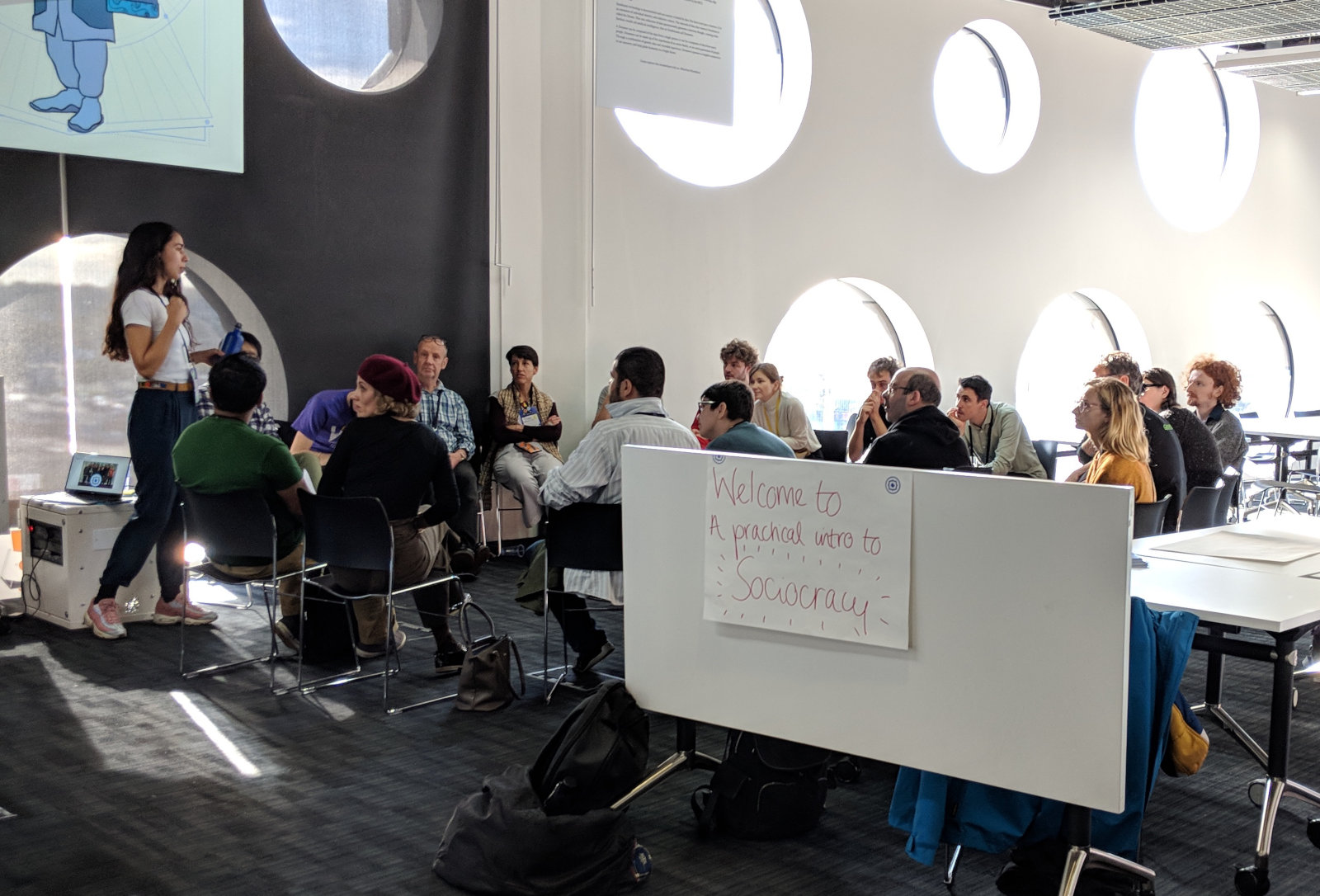
What was the session about?
We had two broad aims: the first was to describe the theory behind Sociocracy and how it can contribute to decentralisation. We wanted to show participants practical examples of use by small and large organisations and collectives alike, from the Quakers to small worker co-ops like ours.
The second aim was to get people participating and practising so that they could really understand what a Sociocratic proposal looks and feels like, which we thought would be the best way to introduce it. We thought this was the best way to bring value to each person in attendance, and also considered it the most effective way to prevent death by presentation slides. This worked by splitting into two groups with Pete and I facilitating the round. We invited a proposal and then hit the ground running by going through clarifying questions, immediate reactions, and critical concerns. After, we invited reflections on the highlights and lowlights of the session, and the practice in general.
How did the session fit in with the theme of decentralisation?
We think that Sociocracy is a valid tool for decentralised decision making whether groups are geographically distributed, or work in the same office. We think that it shows people that their opinions and experience are valuable which leads to an increased sense of satisfaction and productivity. Progressive organisations and collectives must not fall into the trap of a few people making decisions for everyone else - opening up the decisions to everyone who wants to be involved decentralises that power and brings in new perspectives.
We mentioned that it is not a silver bullet, so it needs the investment of time and energy to work, as well as a commitment to following both the theory and practice properly. It's summarised well with the mantra 'good enough for now and safe enough to try' which invites reflection, learning and improvement.
In what way were participants valuable in your session?
The participants were fundamental to the session because they were engaged, kept the round going, and maintained a great momentum. The key to a successful Sociocratic round is listening to others, and they did this beautifully.
How has your session topic progressed since MozFest? Did the session contribute to that progress in any way?
It hasn't progressed with us, but that wasn't the aim so that's fine! We encouraged people to try it for themselves and read about it further if they were interested.
How can people get more information on the topic or get involved?
There are loads of ways to get involved or get more information. There's a working group on Loomio for worker co-ops called Learning & practising Sociocracy where we share learnings, and practice together online. Sociocracy for All is an amazing source of information and we wrote a blog about it a few years ago, when we started to learn about it. One of my favourite things about Sociocracy is that it's decentralised :)
⌘
Decentralised App Speed Dating
(Irina Bolychevsky / @shevski) and Hannah Gardiner (UK)
What was the session about?
A world cafe / speed dating type session for people working on decentralisation projects and people wanting to learn and sample what's happening in decentralisation! There were 7 tables each with a person representing a decentralised app, protocol or organisation (such as IPFS, WorldBrain, Peergos, etc)
How did the session fit in with the theme of decentralisation?
It was a decentralised session where each group was talking about decentralising projects!
In what way were participants valuable in your session?
The projects got to pitch and get feedback and insights from the other participants while learning how best to quickly explain their projects, the problems they are addressing and how. It was a collaborative community learning session facilitated by Redecentralize.org!
How has your session topic progressed since MozFest? Did the session contribute to that progress in any way?
We ran another similar session at the last Redecentralize meetup which was very successful with 6 projects each pitching for 8 mins, 6 times to a rotating group of attendees with talks from Scuttlebutt, BBC, IPFS, Matrix, Mattereum, Holochain and a talk on what the Redecentralize community was focused on.
How can people get more information on the topic or get involved?
Find us at Redecentralize.org and join the newsletter!
⌘
Help us build a federated social network for educators using ActivityPub
Doug Belshaw (Northumberland, UK) and Mayel de Borniol (Athens, Greece)
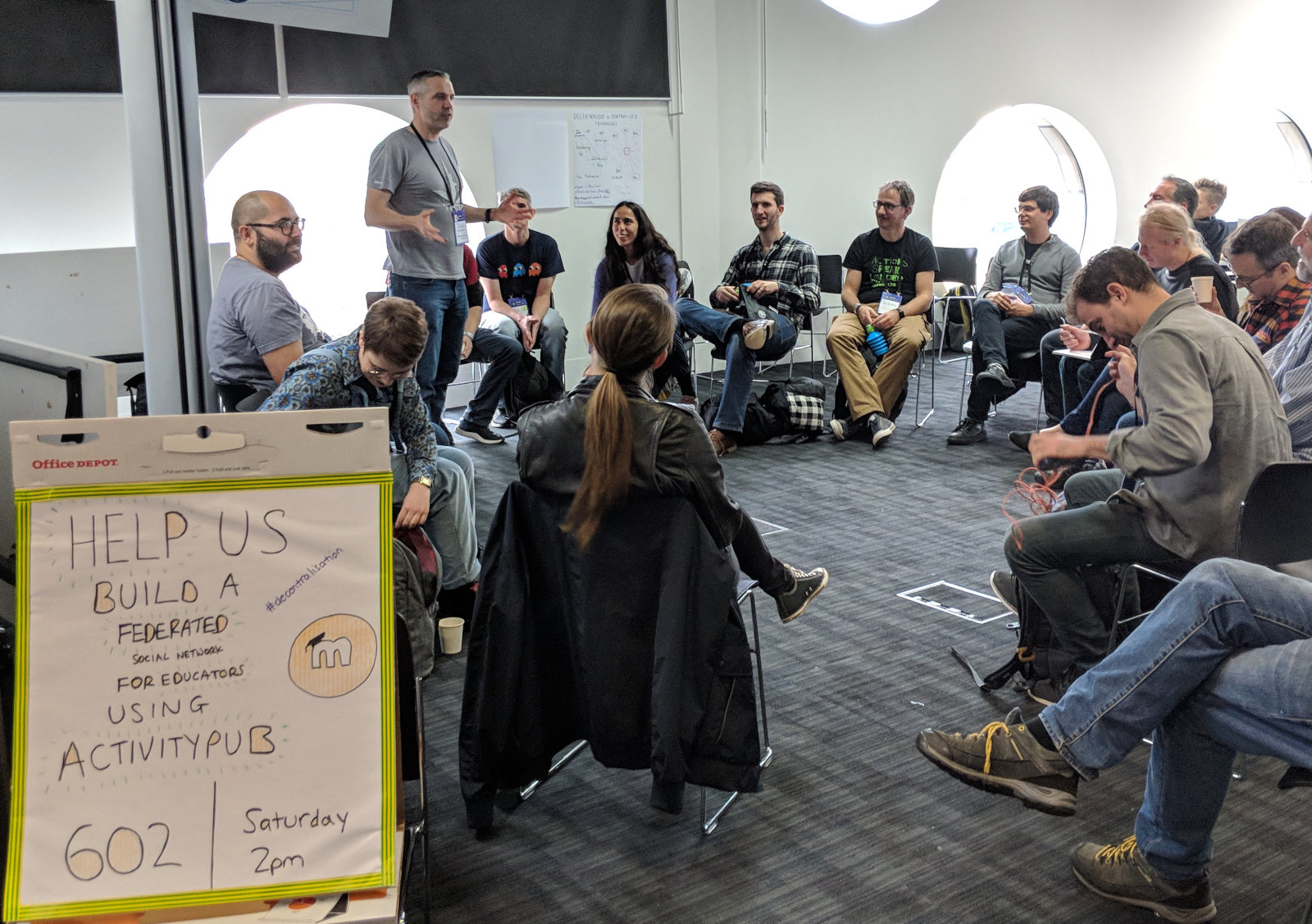
What was the session about?
In the workshop, we not only discussed decentralisation, but practised it! Participants introduced each other to federated platforms and to the ActivityPub protocol (a W3C standard) which powers Mastodon and other networks. We presented the work we've done so far on the MoodleNet social media network for educators, and then broke into smaller groups to consider:
- (i) ways to explain the advantages and peculiarities of decentralisation,
- (ii) additional technologies or approaches we could make use of,
- (iii) potential barriers
After that, we came back together to discuss ways forward for collaboration on decentralised and federated networks. Participants left the session with a deeper awareness of ActivityPub, what the fediverse can be used for, and hopefully with new allies for existing or future projects!
How did the session fit in with the theme of decentralisation?
MoodleNet is a federated social network. Anyone can set up their own MoodleNet server, which can then 'talk' to other ActivityPub-enabled applications. We're keen to educate people on the benefits of decentralisation and ways in which they can advocate for it within their networks.
In what way were participants valuable in your session?
We had a wide range of participants, from teachers to developers to members of W3C working groups. Some were interested in the theoretical aspects of decentralisation, while others wondered how federation might be able to solve very practical problems on the ground. It was particularly useful to have participants with existing expertise and knowledge in this area, who could help explain to others the importance of what projects like MoodleNet are trying to achieve.
How has your session topic progressed since MozFest? Did the session contribute to that progress in any way?
At the Science Fair on the Friday night at MozFest, we'd been encouraged to apply for a Mozilla Open Source Support (MOSS) grant. We hastily made our way downstairs after our session to pitch for the grant, and were delighted to be later informed that we were successful! We're planning to use the $5,000 grant to seed a programme for security and privacy bounties in 2019: https://blog.moodle.net/2019/moss-grant. Planning for, and running, our session at MozFest really helped sharpen our approach which helped us win the grant.
How can people get more information on the topic or get involved?
Everything about MoodleNet is accessible via https://moodle.com/moodlenet. We're starting the testing process at the end of January 2019 with a subset of those who apply to help us out. We're planning for open sign ups to be available in April, but of course anyone is very welcome to contribute to our Open Source project before that. Find out more: https://new.moodle.net
⌘
Co-Creating Participatory Resources
Dirk Slater - FabRiders, based in Stroud, UK
Margarita Griffiths - International Federation of the Red Cross, Geneva, Switzerland
What was the session about?
Participants shared knowledge and lessons learned on designing and co-creating people-powered and participatory resources. Resources are assets that are drawn on by an individual or groups/communities/networks in order to overcome challenges and function more effectively. During the session we shared a resource development lifecycle as a foundation for a discussion on identifying challenges and best practices. We discussed potential solutions and create a list of shared resources and tactics.
And we shared our experience in developing IFRC’s Data Playbook - a collection of social learning curriculum developed for and by humanitarians to improve data literacy.
How did the session fit in with the theme of decentralisation?
Felt this session was core to decentralisation, as all resources should be freely shared, not centralised or behind walls that make them inaccessible to anyone who would find them useful. Resources that are co-created are more likely to be useful to a broader set of communities and networks because ownership is shared between contributors with a more diverse field of experience and connections..
In what way were participants valuable in your session?
As part of our discussion of the lifecycle, participants raised how critical it is for there to be proper archiving so it can be used after death, but also that it exists with a license that allows for modification and reuse. They also helped us better define the Lifecycle and identified missing phases and activities.
At the beginning of the session, participants voiced challenges around
Developing resources to build sustainable and resilient communities
Empowering individual contributors who are unaware of the value of their participation
Understanding the needs of the communities and networks their resources aimed to serve.
Key lessons learned from our work on the Data Playbook that participants said they hope to incorporate into their own projects:
‘Curate not create’ content
Actively solicit feedback along with providing clear and collaborative feedback loops
Celebrate and appreciate contributions
How has your session topic progressed since MozFest? Did the session contribute to that progress in any way?
Many that attended the session have joined our network of resource designers under FabRiders Network Centric Resources Project. And following on that we’ve just published another version of the Lifecycle based on this workshop session and another one at another event: http://www.fabriders.net/network-centric-resources-lifecycle/ (opens in a new tab)
We also held an online discussion based on the topic of co-creation and IFRC’s Data Playbook: https://www.fabriders.net/ncrnotesifrcheatherleson/
IFRC has a post about our MozFest session here: https://media.ifrc.org/ifrc/2018/11/13/showcasing-data-playbook-mozfest-2018/
How can people get more information on the topic or get involved?
Anyone who is interested in co-creation or developing network centric resources can use the resources and join our project at: http://www.fabriders.net/network-centric/
The Data Playbook is here: https://www.preparecenter.org/toolkit/data-playbook - and anyone interested in co-creating a V1 of the Data Playbook should send an email to [email protected].
We’re also forming a Data Literacy Consortium. People can learn more about it here: https://www.fabriders.net/data-literacy-consortium/
⌘
Demystifying AI: Create your own predictive model
Devin Dillon (New York City, USA)
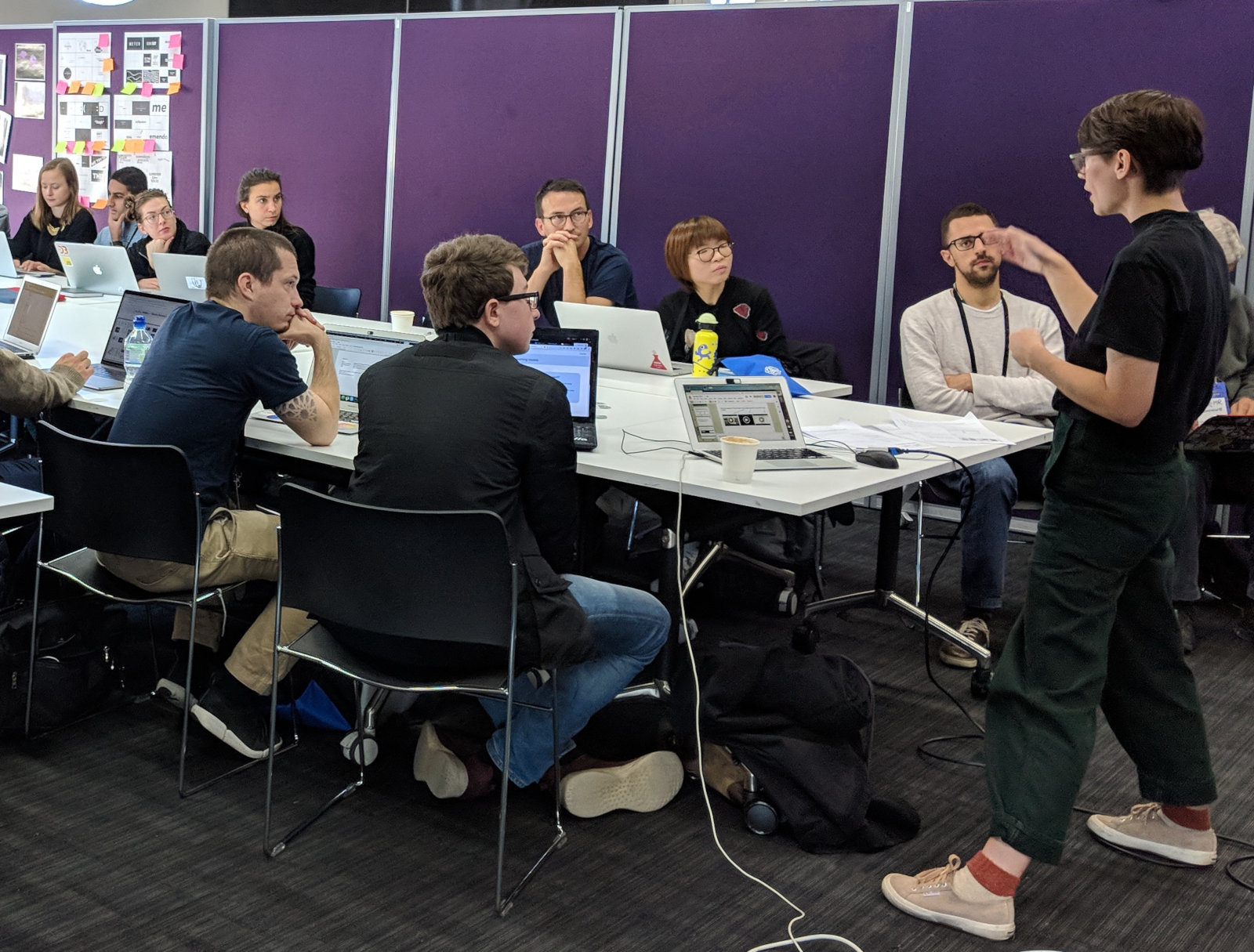
What was the session about?
Participants built their own AI model to explore how AI and machine learning use data to make decisions. Every participant was able decide what their model predicted and were challenge to build their own dataset of text, number or images. Our session used a tool called ML4K (https://machinelearningforkids.co.uk/) to make our models and explore some basic machine learning steps, which broadly include: 1) Choose your (data) Labels 2) Build a Dataset 3) Train your model 4) Test your model.
How did the session fit in with the theme of decentralisation?
To me, this session fit into the decentralisation space as an introduction to AI, a technology that many people don’t understand but is very present in our world. The lack of understanding about AI is preventing important conversations from happening and seems to be encouraging the anxiety people feel about the technology. I hoped this session gave people an entry point to continue learning and making informed decisions about their technology use.
In what way were participants valuable in your session?
Participants explored the tool in different ways from the people around them; everyone made a different model with different datasets. They were able to share what they were working on so we could all learn more.
How has your session topic progressed since MozFest? Did the session contribute to that progress in any way?
The core learning we did at the session, make an AI model, is posted online in 3 parts that anyone can access - Use AI to make an Animal Classifier, Use AI to make a Preference Guesser and Use AI to Make an Emotion Detector
How can people get more information on the topic or get involved?
People can lead this educational program for groups or even sign up to learn with their family at home. Check out AI Family Challenge. We are building our 2019 cohort of program sites now--feel free to email us if you'd like to learn more.
⌘
Back To Basics: Making Your Own Connections
Nicolás Pace (Argentina)
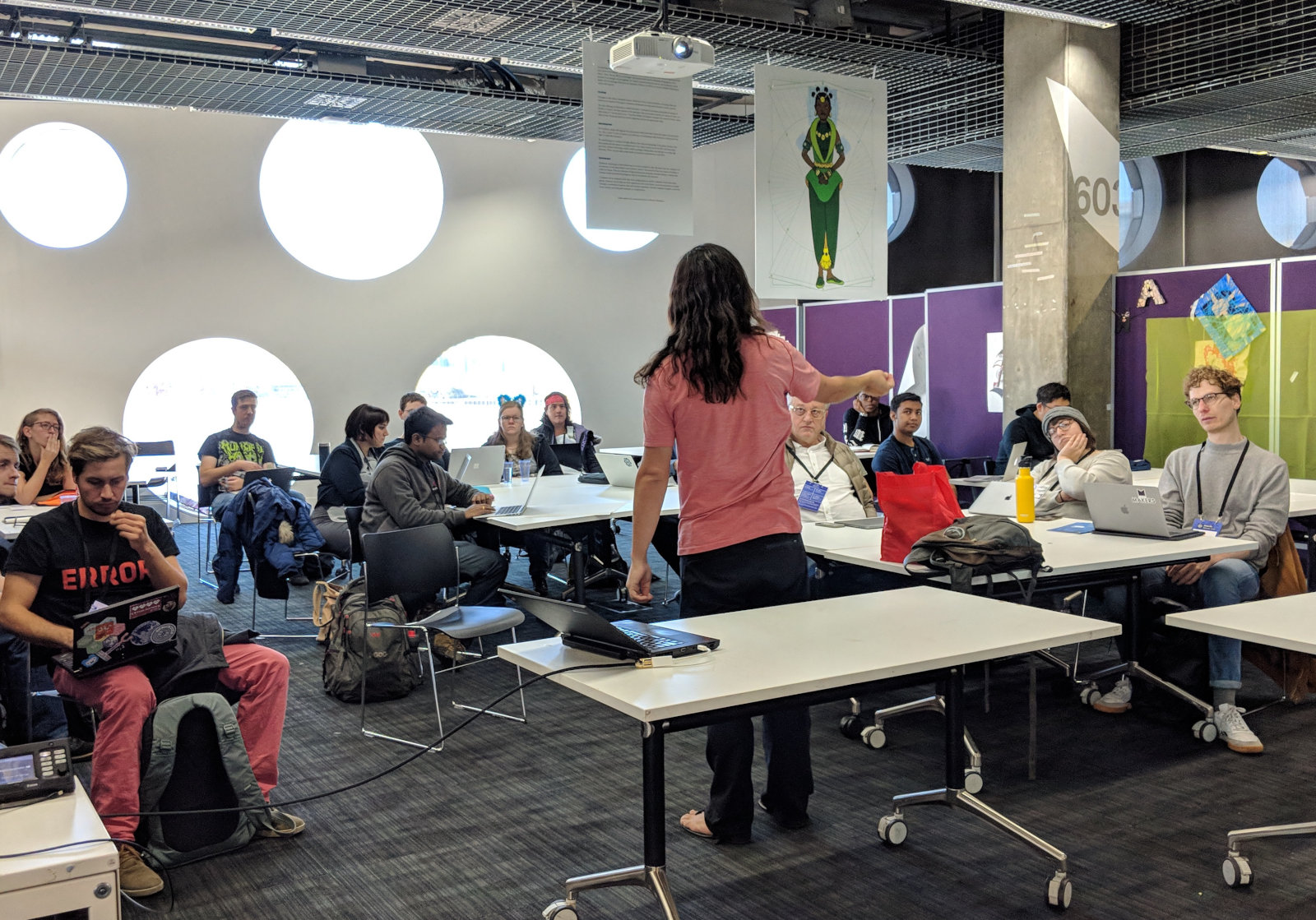
What was the session about?
Participants learned about how to build a do-it-yourself Internet
connection using mesh technologies.
During the session we reflected on what meant to create your own piece
of internet (technically, financially, organizationally), through
testimonies from community members where people are trying to do so and
why, and the difficulties in doing so and how they may overcome them.
How did the session fit in with the theme of decentralisation?
From the user on, in most of the cases everything is centralized.
Still, when we talk about decentralization the conversation usually
starts from the apps on, because the infrastructure we rely our
communications on are not in our hands to affect them.
Controlling our infrastructure for is a chance for us to reclaim our
telecommunications territory, but for many people it might be the only
way of having communications at all.
On the other hand, creating our own infrastructure allows communities to
start rethinking how their communications happen, through whom the data
they exchange passes, and what we can modify to better own it.
In what way were participants valuable in your session?
Participants were diverse and enthusiastic about the activities proposed
in the session. They exchanged opinions about the testimonies that helped enrich the
conversation.
How has your session topic progressed since MozFest? Did the session contribute to that progress in any way?
It allowed to get more people sensitized on the topic.
How can people get more information on the topic or get involved?
http://libremesh.org/
http://librerouter.org/
http://altermundi.net/
https://www.giswatch.org/community-networks
http://twitter.com/nicopace
https://twitter.com/AltermundiNet
⌘
Why there is a need for a public service internet?
Ian Forrester, Ahmed Razek - (BBC UK)
What was the session about?
Very short presentation why there is a need for a public service internet generally alongside the commercial and government surveillance models of the internet. Why the BBC should be a key stakeholder in that process. Then a open Q&A with about 25 people happened for about 50mins.
How did the session fit in with the theme of decentralisation?
The public service internet is decentralised and distributed in nature, its a viable alternative of a centralised internet run by a few corps or a government run internet. Both who conduct in data surveillance.
In what way were participants valuable in your session?
The feedback we got in the Q&A has fed directly into the open process of understanding what it could be. There was lots of open questions and thoughts.
How has your session topic progressed since MozFest? Did the session contribute to that progress in any way?
We ran a whole day session at Mozhouse then took some of the results into the session in Mozfest. The results of both have driven some of the decisions and opened up new possible collaborations.
How can people get more information on the topic or get involved?
https://www.bbc.co.uk/rd/projects/public-service-internet
https://www.bbc.co.uk/rd/projects/databox
⌘
Pulsar Hunters
Rachael Ainsworth, Sally Cooper, Mateusz Malenta and Beth Jones from the Jodrell Bank Centre for Astrophysics at the University of Manchester.
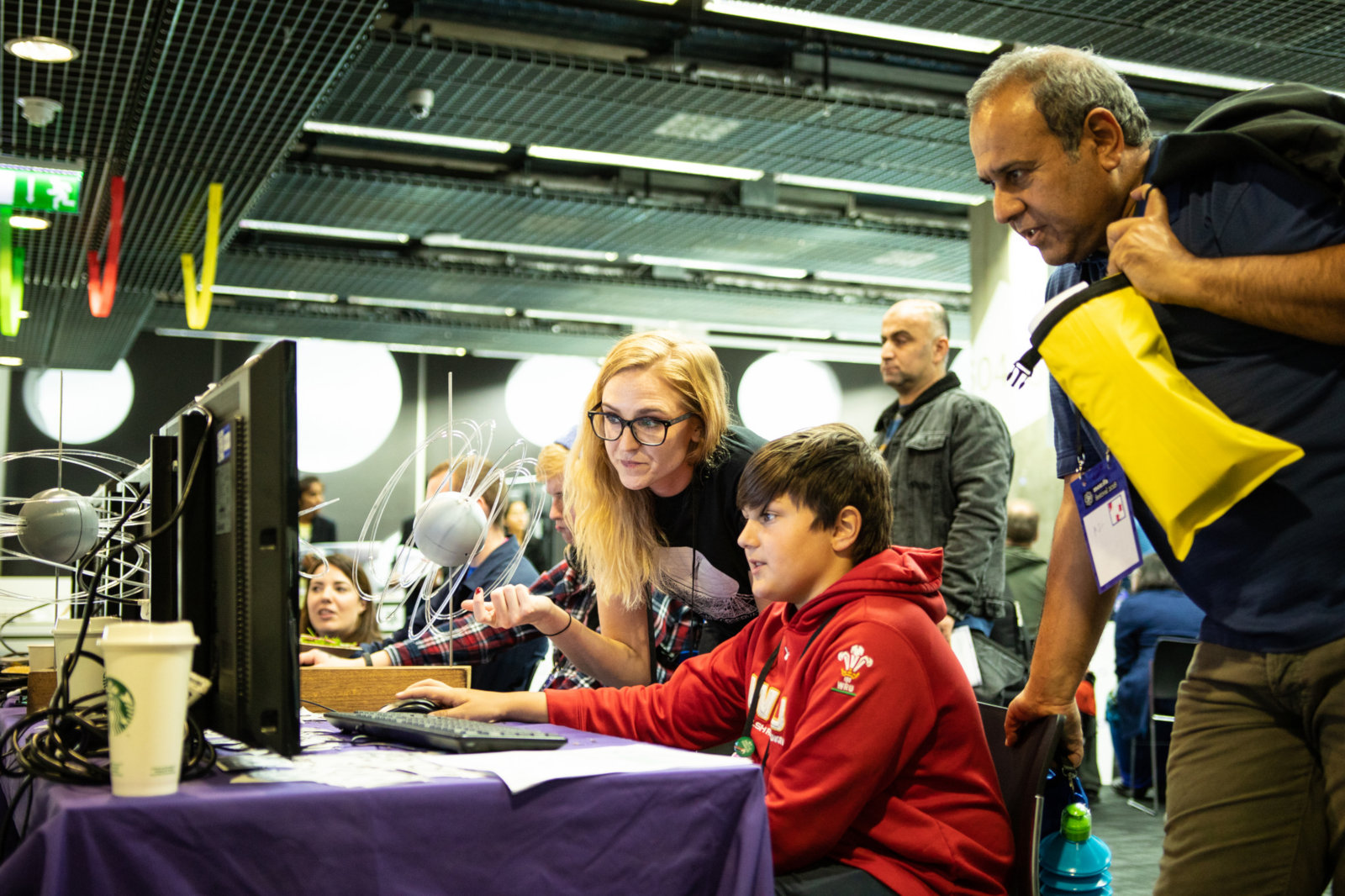
What was the session about?
The Jodrell Bank Centre for Astrophysics needs the public's help in our search for pulsars - really dense dead spinning stars. Faced with tens of thousands of pulsar candidates, we need help identifying interesting patterns in the data to improve our machine learning classifier and tell us which pulsars we should point our telescopes at again. Pulsar Hunters (https://www.zooniverse.org/projects/zooniverse/pulsar-hunters) is an interactive Open Science installation where participants can learn in person about pulsar signals from Jodrell Bank researchers and contribute to classifying real data taken with the LOFAR Telescope.
How did the session fit in with the theme of decentralisation?
It brings the scientific process to the people and gets them actively involved and contributing to the research!
In what way were participants valuable in your session?
As part of a global citizen science project, participants make a significant contribution to our scientific endeavour and share their feedback directly with the scientists.
How has your session topic progressed since MozFest? Did the session contribute to that progress in any way?
The candidates selected by volunteers taking part in Pulsar Hunters will be used to create a labelled dataset that will help us to train our machine learning classifier. This will then help us to find patterns in pulsar data, which can later be used to test various theories, including Einstein’s Theory of General Relativity.
How can people get more information on the topic or get involved?
Start classifying pulsars at https://www.zooniverse.org/projects/zooniverse/pulsar-hunters or interact with us on twitter @PulsarHunters!
⌘
Semantic Web
Sakthi Anand, Tejaswi N, Thomas Wilson (MGR Mozilla Club, India)
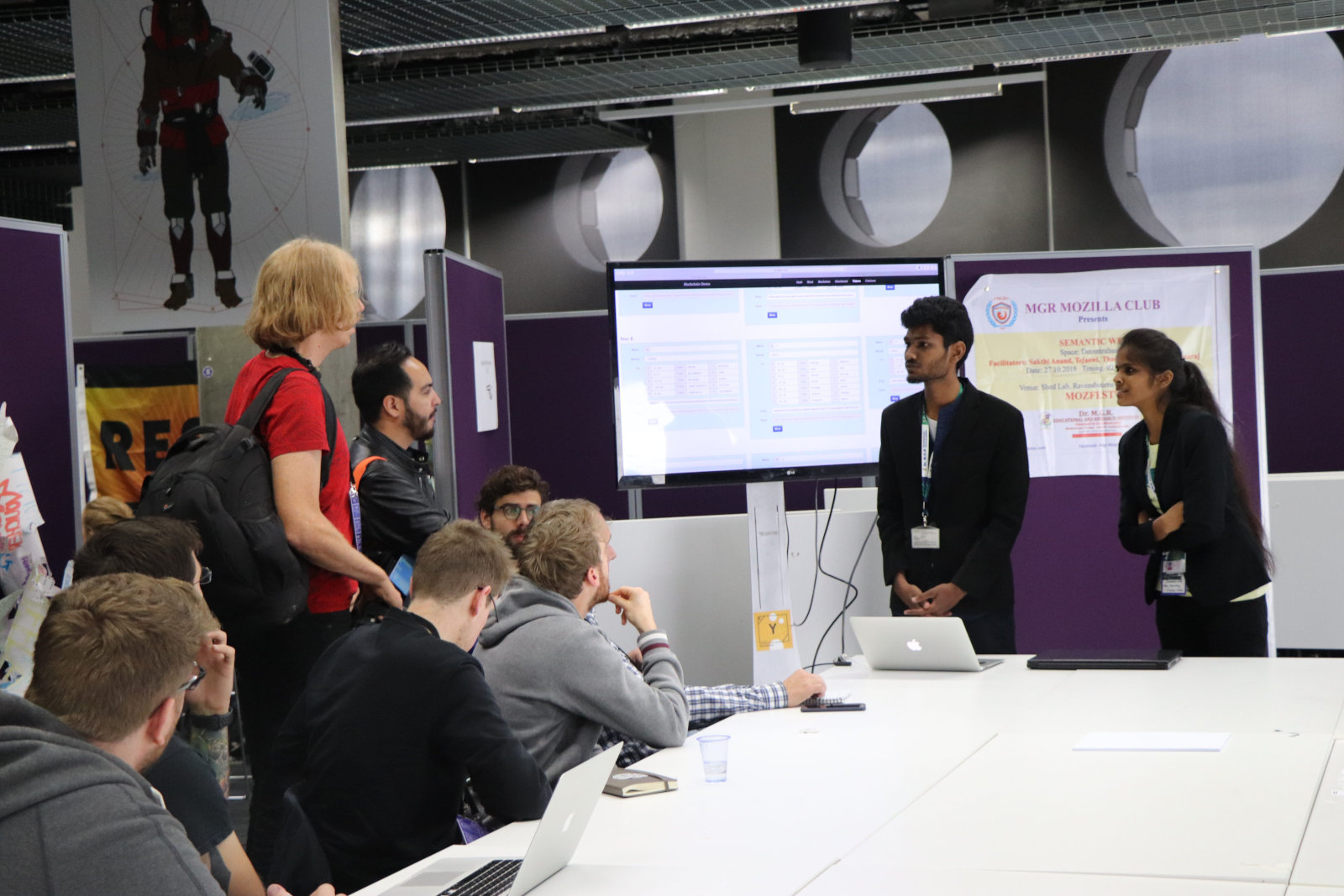
What was the session about?
Our session was basically about the next generation of internet,Web 3.0 and how does it makes an impact in the current Web. We also discussed about problems faced in the current web and the solutions for the same.
Then we had an interaction on how to combine Blockchain and Artificial Intelligence including a live demo. Later we discussed about the underlying technologies that can help create Decentralised Artificial Intelligence along with some real time examples.
How did the session fit in with the theme of decentralisation?
Basically, the building blocks for many decentralised systems is the blockchain. Since,we had lots of topics related to Blockchain,We thought Decentralisation Space is best suited for our session.
In what way were participants valuable in your session?
People working on mainstream projects and doing research attended our session.The way they interacted and discussed about some topics which we didn’t know was helpful.
How has your session topic progressed since MozFest? Did the session contribute to that progress in any way?
The topic is being progressing well after the Mozfest and the session was really helpful for our exposure.
How can people get more information on the topic or get involved?
This blog post on the Convergence of AI and Blockchain
People can also get information by contacting Sakthi Anand
and N Tejaswi .
⌘
The Uphill Journey Of An American Black Cosplayer
Kristin Neal (aka Krissy Victory) USA
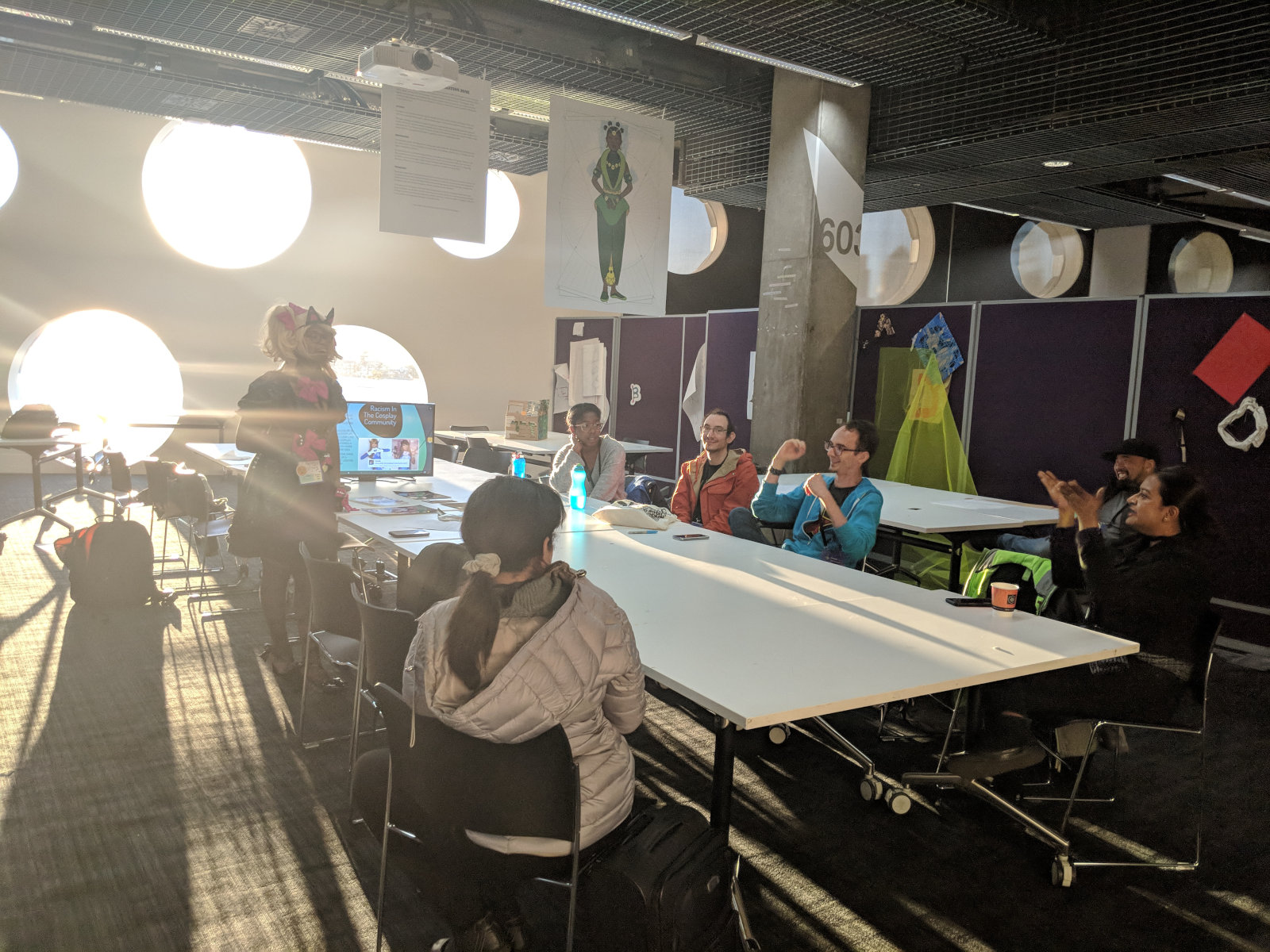
What was the session about?
Describing what Cosplay is, where it usually happens, the people and what it’s like for me as a cosplayer. Step by step what I do as a cosplayer and how I got into it and basic knowledge and happenings.
How did the session fit in with the theme of decentralisation?
Social media is a tool we all use commonly in our day to day lives. I explain how much it means to me and how it connects to my cosplay life in itself. Which is almost everyday with social media and connections to the cosplay community.
In what way were participants valuable in your session?
Yes they loved it. Gave me lots of questions and had great discussions over serious issues. Such as racism, bullying, nitpicking etc. it was a wonderful experience I will value for years to come. Everyone wanted me to come back and speak more, my session even felt short.
How has your session topic progressed since MozFest? Did the session contribute to that progress in any way?
People still talk about it and discuss I think it connected social media and how people take their profiles and accounts. With social media building with cosplay. progressing well after the Mozfest and the session was really helpful for our exposure.
How can people get more information on the topic or get involved?
Searching up Cosplay in google or other forms of media. Asking me “krissyvictory” and I will gladly answer your questions. Talk to your fellow comic book video game store about events!
⌘
Is the Netflix of podcasts inevitable?
Gideon Goldberg (London) and Annabel Church (Berlin).
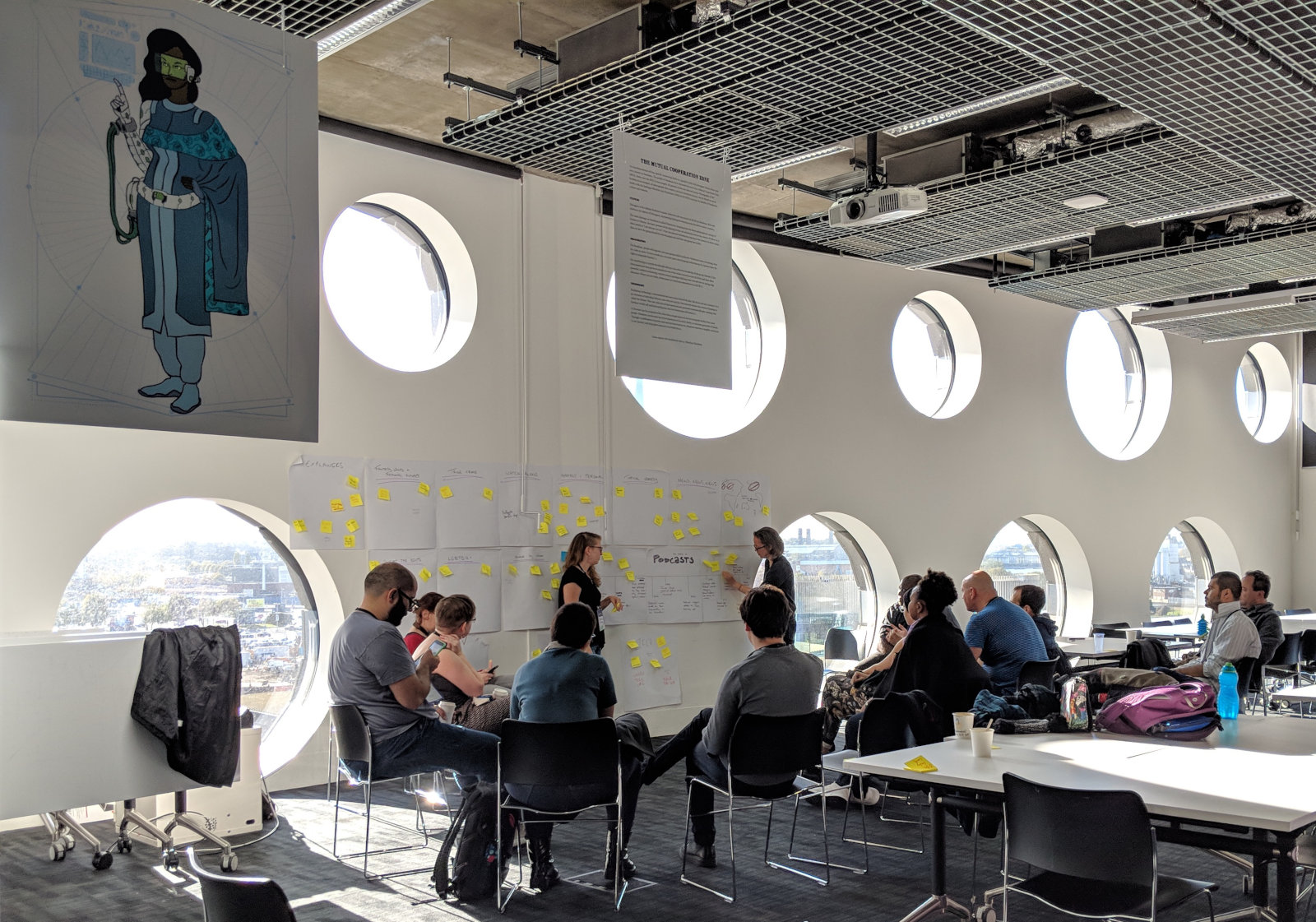
What was the session about?
The session was an opportunity for people who love podcasts to get together and talk about and share their favourites (and their own), we think this works better than any recommendation algorithm!
We also discussed the history of the medium and going right to the present discussed the impact of new apps which are taking a more centralised approach to podcast distribution.
How did the session fit in with the theme of decentralisation?
Podcasting is at a crossroads where the traditional decentralised approach based on hosting public RSS feeds is being challenged by new players who are moving the medium more to a closed app model. Using some scenarios we explored the impact of these changes and how to ensure podcasting does not become a more closed and centralised medium.
In what way were participants valuable in your session?
The participants were super engaged on the topic, many not only listened but also had their own podcasts. This ended up guiding the session to include more sharing of tips on how to get started creating and hosting your own podcast.
How has your session topic progressed since MozFest? Did the session contribute to that progress in any way?
We created an emerging session during MozFest which gave an opportunity for participants to keep the conversations going.
How can people get more information on the topic or get involved?
There is an open google doc where participants favourite podcasts were collated, please take a look and add your own!
⌘
Weaving Web-native Stories through Cultural Collections
Philo van Kemenade (@phivk) Cultural Technologist - Slovak National Gallery, Storytellers United, Sensorium Festival]
Sophie Dixon (@sophiedixon1) - Artist/Co-founder Mnemoscene
Joscha Jaeger (@OpenHypervideo) - Independent Creative Technologist, filmicweb.org
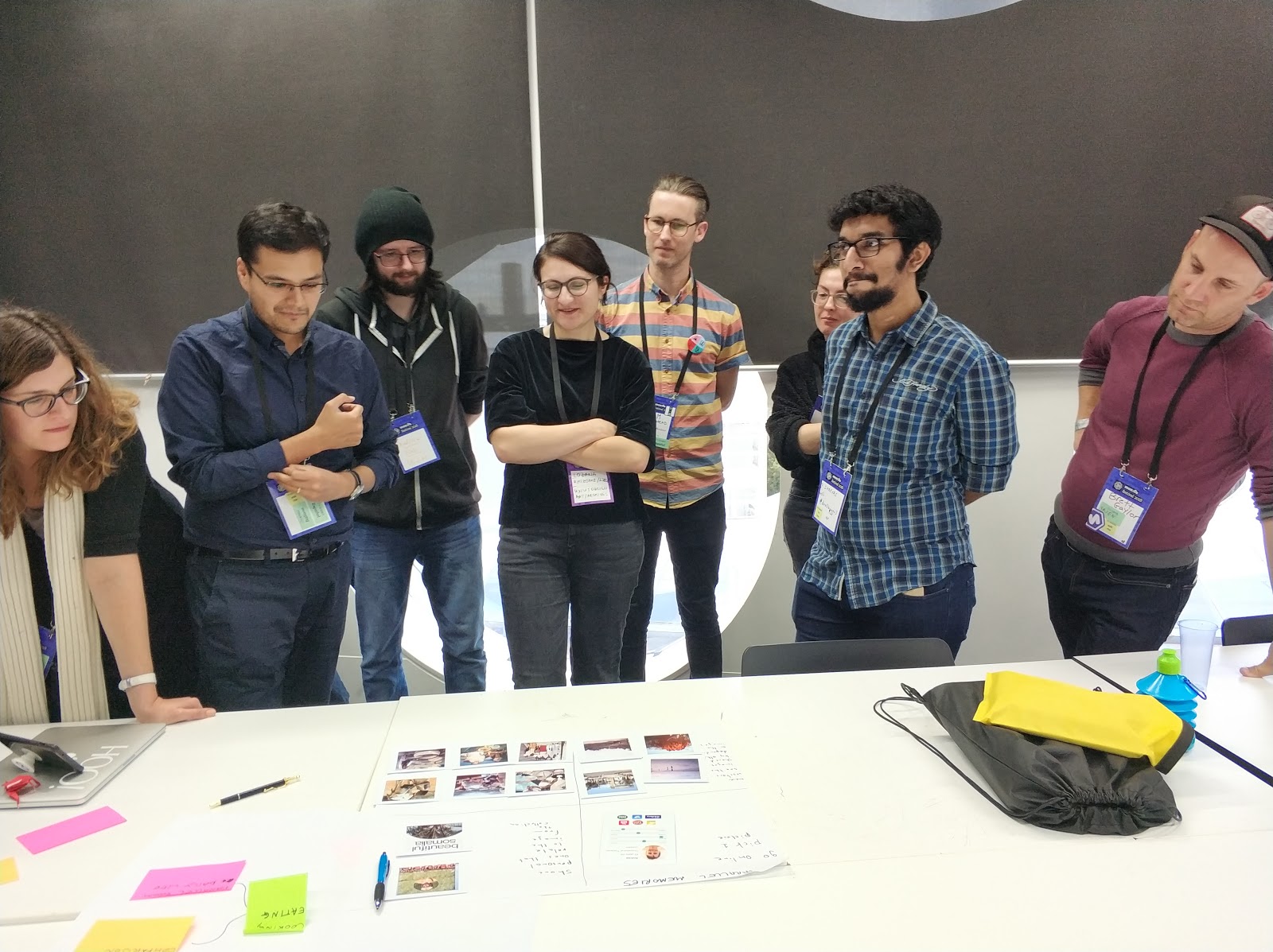
What was the session about?
Organisations like galleries, libraries, archives and museums are increasingly opening up their collections online. This is great, but how do we make sure people find out about it and have a meaningful experience?
After a quick showcase of our own work on digital storytelling projects, we presented three different collections of openly licensed works. We prepared the sets of works as small cards with a title and some basic metadata. These helped to facilitate an open discussion around the table. Participants then formed two groups - each working with one collection - in order to paper prototype a story native to the web.
The groups were given Persona Cards to develop ideas that would appeal to different audiences. The cards gave the details of different fictitious people including their name, age, role, hometown, personality scales and random brands to trigger associations.
Both groups quickly started vivid discussions on the different ways to tell a story about their collection. Each group then presented their paper prototypes and gathered feedback on their ideas. The session ended with a discussion of insights, challenges and opportunities. Participants were finally invited to join the “Storytellers United” Slack community.
How did the session fit in with the theme of decentralisation?
The session explored how meaningful narratives can be created from data which is free, and openly shared.
What happens when cultural content is shifted from centralised, institutional holdings into the hands of the general public? What opportunities does this present for sharing knowledge and expanding our collective experience of culture? What can organisations do to increase engagement and creative reuse of their cultural collections?
In what way were participants valuable in your session?
This was the first time we delivered this workshop and so participants gave us valuable feedback on the flow of the workshop format. Through observing and talking to participants we were able to establish that:
People had a great time thinking about how to creatively reuse the collections we had prepared. Working on ideas for storytelling formats provided a great common goal for groups.
Working with physical cards worked magic and was a great way to facilitate group discussion and shared creativity.
There were interesting differences and similarities in the paper prototypes that people created.
Cropping collection items to fit our square cards lead people to make a strong association with Instagram posts. This was definitely noticeable in the proposed storytelling formats 😂
How has your session topic progressed since MozFest? Did the session contribute to that progress in any way?
The positive feedback from participants attending the workshop inspired us to facilitate more of these session formats in the future. Cultural organisations who would be interested in a workshop like this should get in touch! We are also thinking of publishing the workshop materials as well as a small facilitation guide, so others can learn from, build upon and improve this workshop format.
How can people get more information on the topic or get involved?
We invite participants to the “Storytellers United” Slack community, which is where we have ongoing conversations on all things related to storytelling innovation.
Some of us will be pushing the boundaries of digital storytelling at the Storytellers United Hack Jam in Manchester 27-28 February 2019. This will be a great opportunity for people to work on themes related to the session!
Also check out the openGLAM community of people working openly with Galleries, Libraries, Archives and Museums:
http://twitter.com/openglam
https://twitter.com/search?q=%23openglam
⌘
Distributing the wealth created by open source software fairly?
Georg Link, USA

What was the session about?
At MozFest 2018, 23 people gathered to discuss the question of "distributing the wealth created by open source software fairly?" In small groups, participants discussed problems of interest, chose one problem to work on, and later presented their solutions to the larger group. Takeaways are summarized in this blog post: https://opensource.com/article/18/12/wealth-open-source-distributed
(Group photo of MozFest 2018 participants who discussed wealth distribution in open source.)
How did the session fit in with the theme of decentralisation?
Decentralization is a core attribute in how open source software is developed. No one person, company, foundation, or open source project is in control. Some open source software projects have hundreds of dependencies with other open source projects for components, frameworks, and libraries. This MozFest session focused on the specific aspect of wealth creation and transfer within this distributed network of projects, foundations, companies and people.
In what way were participants valuable in your session?
As a facilitator, I provided questions and a structure for discussion. Participants created the outcomes of the session by contributing their interests, understanding, experiences, and ideas. Some participants were helpful in capturing the conversations within the groups and provided me their notes so that I could summarize discussion points for the blog post.
How has your session topic progressed since MozFest? Did the session contribute to that progress in any way?
We shared the outcomes from the conversation with a wide audience through a blog post on Opensource.com. The session has taught me that problem of wealth distribution in open source is much less understood than I thought. I learned to consider more questions in trying to work on a solution. The conversation is continuing in many different forums, such as SustainOSS, and on Twitter.
How can people get more information on the topic or get involved?
The challenge of the session topic is that it concerns everyone in open source and conversations are scattered across the ecosystem. SustainOSS is great forum where people who are interested in the topic get together. Other projects I know of that work in this area are Bugmark, Snowdrift, Open Collective, or Registry of Funding Platforms.
⌘
Jandig - augmented reality exhibition
VJ pixel, Brazil
What was the session about?
We created a collaborative exhibition from already existing Jandig’s artwork collection. The display started with an almost blank wall and thought the first day of the festival the participants filled it with stickers with AR markers. We recorded this process in a series of photos created a time-lapse video that we released on the second day of MozFest: When a participant or group arrived, we presented the project (including concepts needed to understand it, like AR) and ask about their skills/interests. During this conversation, they were able to see the available artwork and choose some stickers to place on the wall.
How did the session fit in with the theme of decentralisation?
The session Jandig is about collaboration between artists and inviting the public to get involved in creation.
In what way were participants valuable in your session?
The participants created the exhibition by choosing what and how many AR markers they put, and where they stick them.
How has your session topic progressed since MozFest? Did the session contribute to that progress in any way?
It increased the morale of the team to have the project participating in the great gathering that MozFest is.
How can people get more information on the topic or get involved?
How can people get more information information on the topic or get involved? We have a website in Portuguese, a Telegram group and a repo on GitHub.
⌘
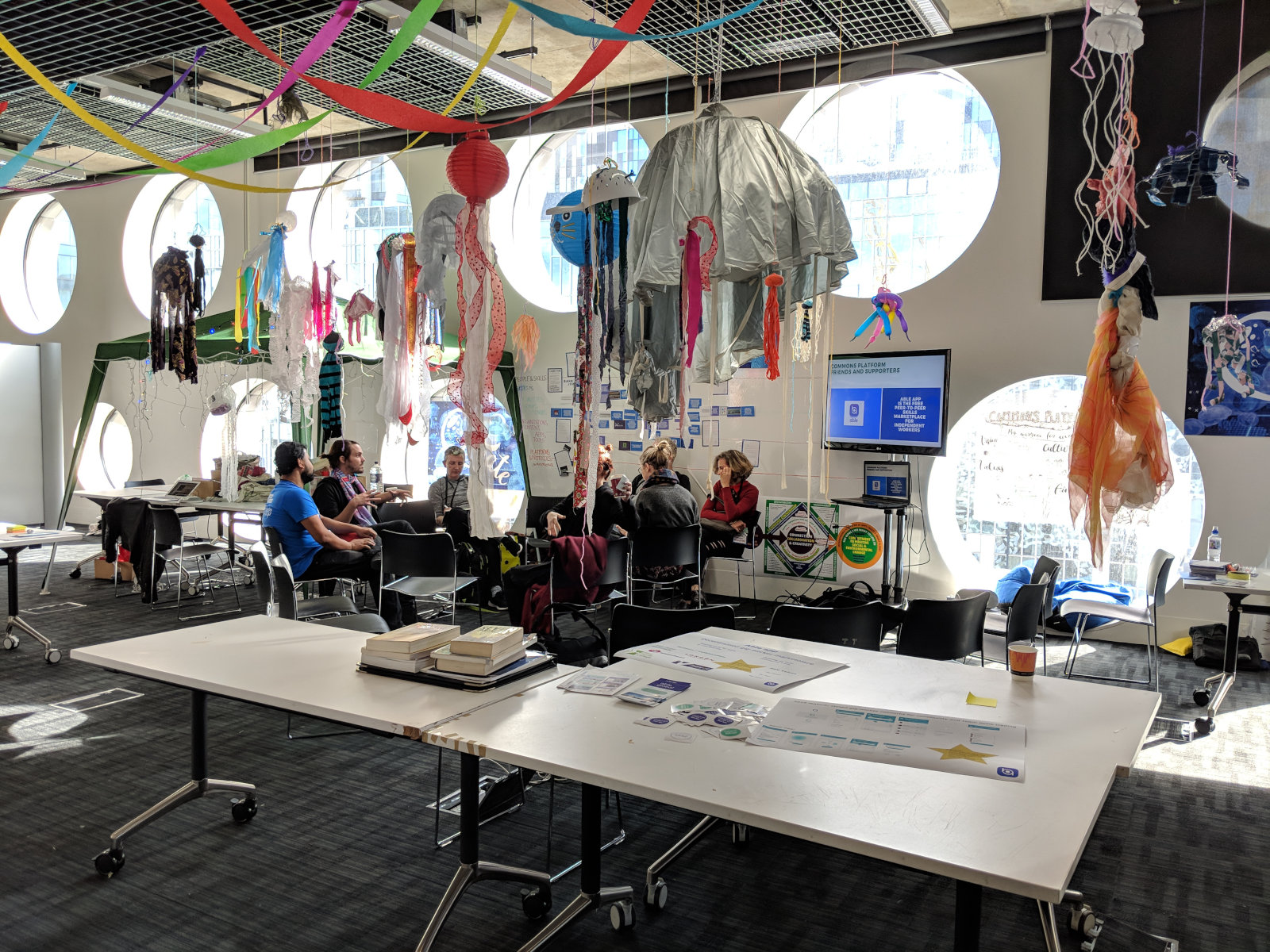
Other sessions included:
- Time, Space and (dis)Place
- SmashingThePatriarchy101: Dismantle social injustice via Decentralisation
- Commons Platform: Proof of Collaboration on Distributed Ledgers
- Empowering Active Citizens: Political Engagement through Wikidata
- Open Science Organization (OSO) is building a community-managed decentralized platform for open, unbiased, and efficient science
- The co-designed city; building smart cities with embedded social justice Expended Reality
- Constructing the "don’t be evil" company but this time for real
- Decentralised identities, storage, and applications with Blockstack
- Decentralized Web Standards: From ActivityPub to Webmention
- Digital Equality
- Publishing and Hosting on the Peer-2-Peer Web
- Commons Platform: Creating Solidarity and Connecting Movements
- Build your own private by design voice assistant
- Ephemeral, lost, forgotten: how to help to preserve human history in an ever-changing world
- Building a dynamic real-time DApp without a blockchain
- How Open Recognitions Can Save Imploding or Stagnant Decentralized Communities
- OONI Project: a tool to monitor censorship in Argentina
- Building Self-Deployable Community Wireless Network for Rural Areas
- Commons Platform: Integrating Tools, Apps, and Orgs
- Message Delayed: Designing Interplanetary Communication Tools
- Offgrid connections: from the South Pacific to Mars
- Data for Trade Unions
- Rage against the Machine Learning: Why ML needs YOUR input!
- Commons Platform: Creating the Conditions for Collaboration
- Building Open Markets Atop Open Blockchains
- Decentralized Publishing
- Everyone is invited: Increasing participation in peer review with live-streamed preprint journal clubs
- Prototyping tools for image sharing on the web, featuring CC search
⌘